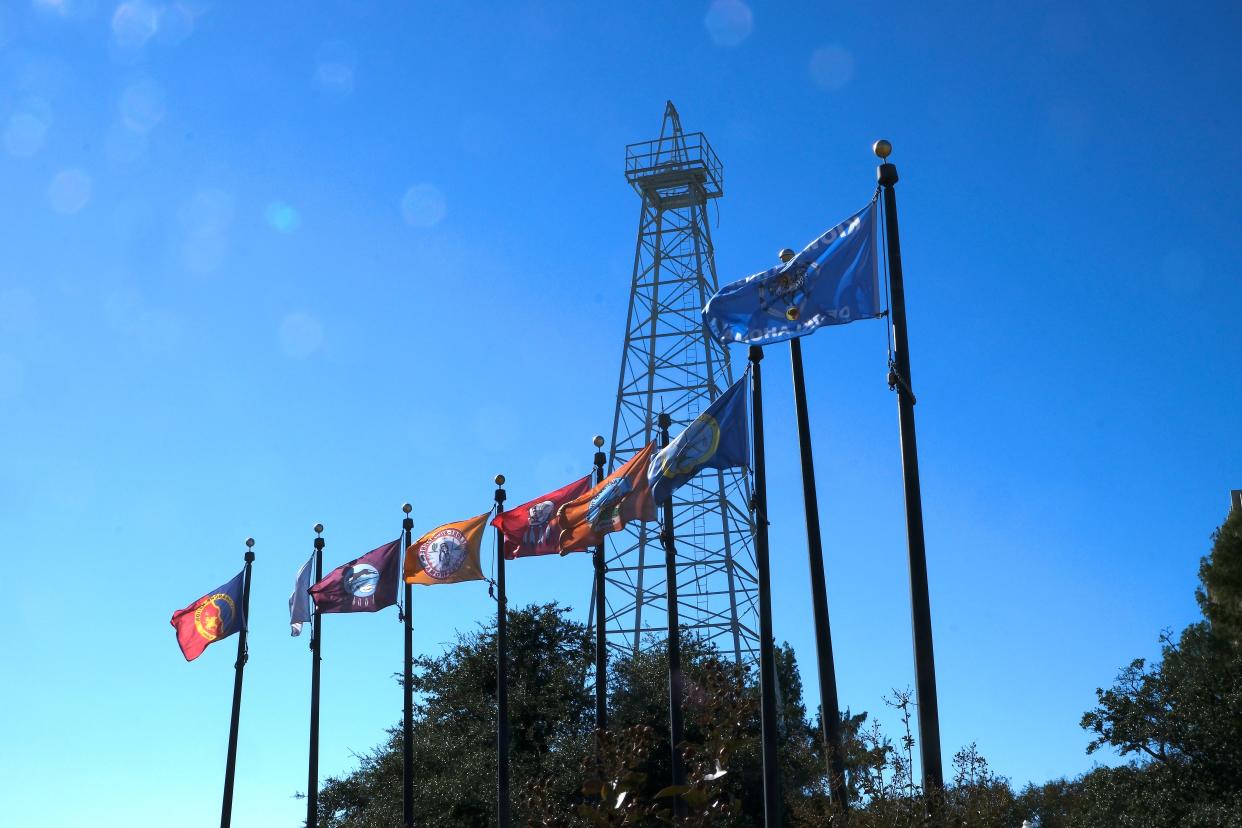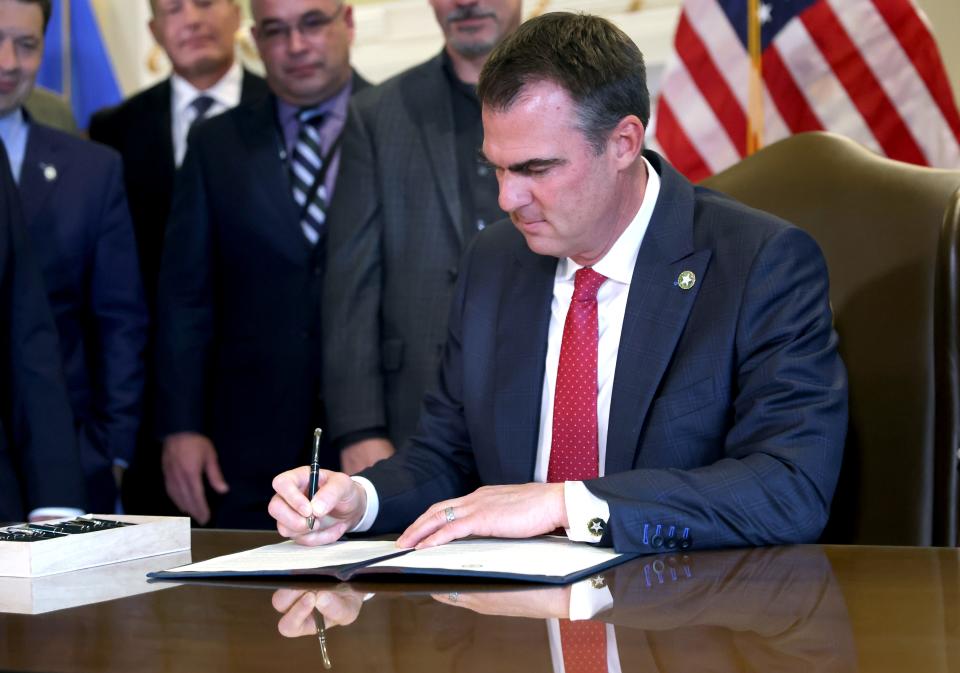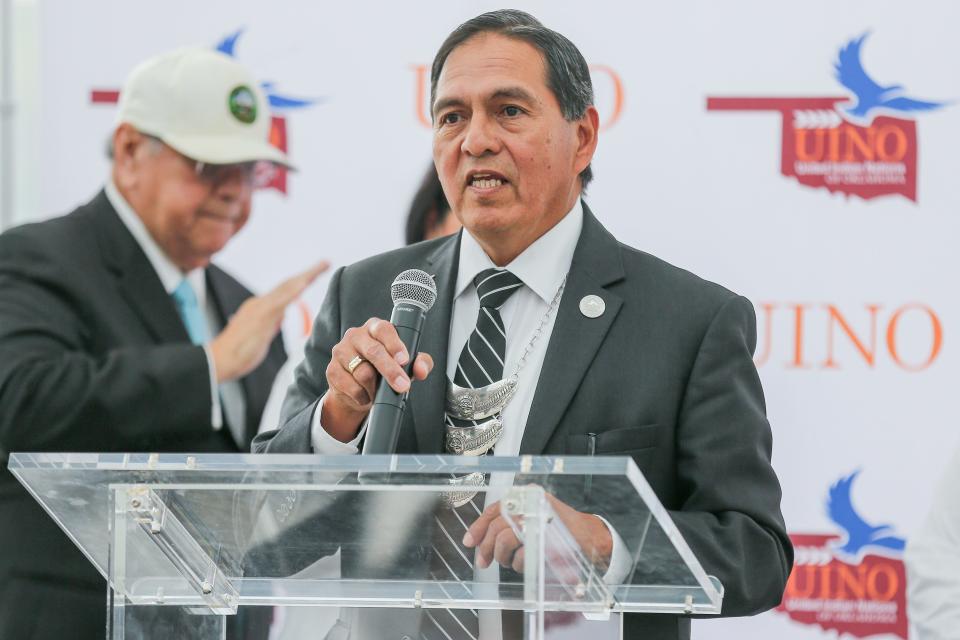Oklahoma governor creates task force to address law enforcement on tribal reservations

- Oops!Something went wrong.Please try again later.
Oklahoma Gov. Kevin Stitt says he is creating a task force to address the “negative effects” of the McGirt v. Oklahoma decision, the three-year-old U.S. Supreme Court ruling that has led to the recognition of several tribal reservations in eastern Oklahoma.
Stitt issued an executive order Friday to create the task force, saying a recent conflict between county and tribal law enforcement agencies in Okmulgee County served as a “stark reminder of the broken system created by the McGirt decision.” Questions about what agencies have jurisdiction on tribal reservations can leave law enforcement officers and crime victims at risk, he said.
Stitt ordered the 13-person task force to deliver a report by June 1 with recommended legal and policy changes. As one example, he called for standard cross-deputization agreements between state and tribal law enforcement agencies.
“Stakeholders must come together to discuss practical solutions and propose recommendations to usher in uniform, lasting change,” Stitt said in his executive order.

Gov. Kevin Stitt has long criticized Supreme Court's McGirt ruling
The governor has been the chief critic of the McGirt ruling since it came down in July 2020, saying it peeled back the state’s ability to keep communities safe on land now recognized as tribal reservations. Federal law limits state jurisdiction over crimes involving tribal citizens on those lands.
McGirt v. Oklahoma, 3 years later: How police work on the Muscogee Nation reservation
Tribal officials have repeatedly pushed back against the governor’s assertions. They have pointed out their law enforcement agencies have the same goals as any other police force. They also have repeatedly called for Stitt to meet to work through concerns.
The new task force will include two members representing tribal nations, including one person representing one of the Five Tribes and one person from one of the other tribes based in Oklahoma.
David Hill, the principal chief of the Muscogee Nation in Okmulgee, said in a statement that he and other Muscogee officials welcomed the opportunity to work collaboratively with the governor’s office.
McGirt continues to cripple public safety operations across Oklahoma— and today I formed a Task Force to confront those issues.
We’ll gather stakeholders from across the state to address jurisdictional challenges and usher in lasting change.
Learn more: https://t.co/gwLSf1Go1h— Governor Kevin Stitt (@GovStitt) December 22, 2023
He said the task force should “focus on promoting cooperation, not enflaming division.”
He also called for a seat for every tribe on the task force, noting 11 seats had been assigned to state officials, including the House speaker, Senate president and attorney general.
“There are 39 unique tribes in Oklahoma, not just two,” the Muscogee Nation said. “Eleven state agencies will be represented to speak for themselves. Tribes should be afforded the same opportunity.”

What to know about the new task force
This is at least the second task force created by Stitt as a result of the McGirt ruling. The first met in 2020, soon after the decision was handed down. Its report called for the need for consistent laws and regulations but made no specific recommendations.
Stitt has named the new task force the “One Oklahoma Task Force” — a reference to an online campaign he launched in July to criticize the fallout of McGirt.
One of the governor's most vocal concerns is losing the state’s ability to tax tribal citizens who live on the reaffirmed reservation lands. The Oklahoma Supreme Court will hear arguments in a related case in January.
Abegail Cave, a spokesperson for the governor, said the governor’s office, law enforcement agencies and tribal nations had already been discussing some of the topics the task force will address. But she confirmed the task force was created in direct response to the recent law enforcement dispute in Okmulgee County.
The incident occurred Monday when Muscogee Nation Lighthorse Police officers were attempting to drop off an arrested man at the county jail. A jail worker refused to take the man into custody, and a physical altercation between the jailer and a Lighthorse police officer ensued.
A Muscogee Nation District Court judge signed off on a warrant for the jailer’s arrest on Wednesday. Officials said he voluntarily turned himself in Thursday and was then released on his own recognizance. The first hearing in his case is set for Jan. 17.
Molly Young covers Indigenous affairs. Reach her at mollyyoung@gannett.com or 405-347-3534.
This article originally appeared on Oklahoman: Why Oklahoma Gov. Kevin Stitt is creating new tribal safety task force

